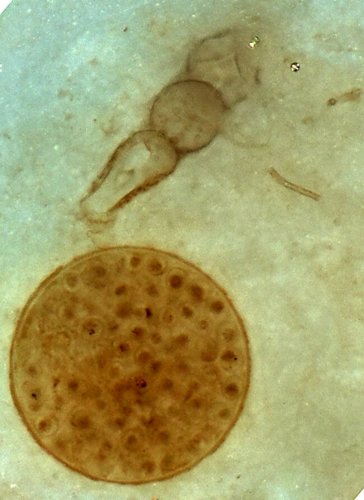 unique
scene, incidentally spotted in 2008 on a cut face of a small piece of chert,
shows a rotifer approaching a spherical alga colony superficially resembling
extant Volvox. Extant rotifers are known to snatch cells from
Volvox spheres to eat them. Apparently the picture indicates that
this snatching mode of grazing has been going on for at least 400 million
years.
unique
scene, incidentally spotted in 2008 on a cut face of a small piece of chert,
shows a rotifer approaching a spherical alga colony superficially resembling
extant Volvox. Extant rotifers are known to snatch cells from
Volvox spheres to eat them. Apparently the picture indicates that
this snatching mode of grazing has been going on for at least 400 million
years.
Neither rotifers nor spherical algal colonies have ever been seen in the Rhynie chert before. The oldest reported fossil rotifers were found in amber dating to the Tertiary. The distinct features of the present fossil specimen and its great age compared to any other known rotifer may justify regarding it as a new species.
More problematic is the placement of the alga into an established clade. By a lucky coincidence it has been cut right through its centre so that its outer sheath is distinctly seen in cross-section. From the distribution of the cells it can be concluded that there were about 500 in the whole sphere. As it is not hollow it lacks the typical feature of volvocacean spheres. There are only a few species with the habit of spherical colonies among the vast numbers of Green Algae, Golden Algae, and even the basically different Blue-green Algae (Cyanobacteria). (Thanks are due to Józef Kazmierczak and Robert Lee for emphasizing a possible affiliation with the latter.)
The dramatic scene featuring rotifer and alga is set among terrestrial vegetation flooded by the Lower Devonian hot spring system at Rhynie. Apparently the attack was spoilt by quick formation of silica gel making the rotifer get stuck before it could harm the alga. One even can tell what came next: The rotifer was bound to starve while the alga went on living within the gel where it was provided with all necessities of life via diffusion.